Welcome to the July 2015 issue of the Global Washington newsletter.
IN THIS ISSUE
- Letter from our Executive Director
- Question of the Month
- In the News: The Fight for Universal Education
- Featured Organization: Sahar
- Changemaker: Patrick Awuah, Founder & President, Ashesi University
- Welcome New Members
- GlobalWA Member Events
- Career Center
- GlobalWA Events
Letter from our Executive Director
One of the Sustainable Development Goals (SDGs) currently being proposed is to “ensure inclusive and equitable quality education and promote lifelong learning opportunities for all.” This is a formidable challenge given that 58 million school-aged children are not currently in school. Between now and 2030, the international community is charged to come together to finance and provide education to reach this goal, and several Global Washington members are already playing a role.
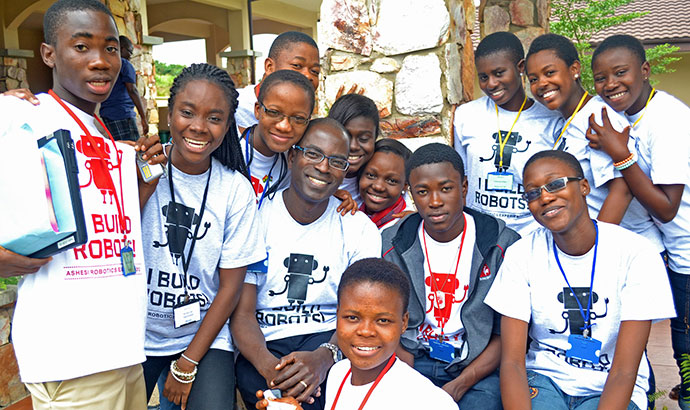
Non-profits such as Mission Africa and Relief and Education for Afghan Children (REACH) provide funds so that children (especially girls) have the opportunity to attend school. Others such as Ashesi University, Rwanda Girls Initiative and International Leadership Academy of Ethiopia operate schools that provide quality education, technical skills and inspire critical thinking. Mona Foundation and Sahar work with local communities to support primary education and build community.
While there is no silver bullet to break the cycle of poverty, empowering individuals through education has been proven to have a transformational impact. The SDGs will further elevate the need for education, examine the barriers, and chart effective solutions. Global Washington members will be part of this progress.
Sincerely,

Kristen Dailey
Executive Director
Question of the Month

Hasan Minhaj
GlobalWA will ask you a question every month and synthesize the responses and make available to our member organizations. Please take a moment to respond to the question for this month:
Will you be attending the GlobalWA Member Celebration on September 12?
In the News
The Fight for Universal Education
The 1948 Universal Declaration of Human Rights states that “everyone has the right to education,” but only in recent years has significant progress been made towards ensuring protection of that right. Between 2000 and 2010, the number of out-of-school primary aged children dropped by almost 37 million. Today, more girls are enrolled in school than ever before, and the number of students in secondary schools is rising substantially.
There is, however, still much work to be done to ensure every child has access to education. 58 million children who should be in primary school are not, and 63 million adolescents between the ages of twelve and fifteen are prevented from continuing their schooling. Girls in particular suffer from a lack of access to education with young women facing violence and discrimination that keeps them out of the classroom.
Quality education has the capacity to transform both communities and individuals. It is a powerful tool that can end generational cycles of poverty and provide a strong foundation for sustainable development. This is why education is such a crucial component of the global development puzzle.
Why Education Matters
Education generates sustainable change that spans multiple generations. Just one extra year of schooling increases a person’s earnings by up to 10% and provides them with more diverse employment opportunities. A quality education equips children with the knowledge they need to transition smoothly to adolescence and adulthood, and become active members of their society.
Access to education is a key component of improving global health and helping people make informed decisions about their health. By facilitating access to treatment and fighting against stigma and discrimination, education helps combat preventable diseases like HIV and malaria. Educated adults are likely to have smaller, healthier families, and they often pass healthy habits on to their children. Educated women are better equipped to control how many children they have. In Mali, for example, women who receive a secondary education or higher have an average of three children, compared to women with no education who average seven. Women with higher levels of education are also more likely to seek out health care and support during their pregnancies, resulting in improved maternal and newborn health. Furthermore, a child born to a mother who can read is 50% more likely to survive past age five.
Barriers to Access
Poverty is a significant barrier to accessing education. Even when primary school is free, the additional charges for uniforms, textbooks, teacher salaries and school maintenance are too large of a financial barrier for many families. In many countries where primary school is free, secondary school is not, and children’s educations are terminated much too early. In sub-Saharan Africa, for example, children from the richest 20% of households reach ninth grade at eleven times the rate of those from the poorest 40% of households. Children living in poverty are also frequently pulled out of school and forced into the workplace to provide for their families.
Humanitarian emergencies, particularly war and conflict, are another barrier to education. More than 40% of out-of-school children live in conflict-affected areas, and millions are forced out of school each year due to natural disasters. A safe-school environment can gift children with a sense of normalcy during a crisis, and help societies bounce back quicker after a disaster. Unfortunately, only 2% of humanitarian aid goes to education during a crisis, and children’s education often slips through the cracks as a result.
Education and Gender Discrimination
Girls face additional and unique barriers to education such as child marriage and early pregnancy. Many countries place little value on the education of girls. Girls are more likely to be pulled out of school to help with domestic labor due to the perception that their proper place is in the home. Families with limited resources may choose to send their sons to school instead of their daughters and girls who do try to attend school often face violent retaliation.
Approximately 34 million girls worldwide are out of school, and women comprise nearly two-thirds of the world’s illiterate adult population. An estimated one-third of girls in the developing world are married before age eighteen, and another estimated one-third of women in the developing world give birth before age twenty. Educated women are less likely to marry early and against their will and are more likely to have healthier babies later in life. Women who finish school are also more likely to send their children to school, and are better equipped to provide for themselves and their families.
Global Washington Members Fighting for Universal Education
- Amigos de Santa Cruz Foundation: Since 1998, Amigos de Santa Cruz has been working to improve the lives of the indigenous people of Santa Cruz la Laguna, Guatemala through support for education and sustainable economic development. Amigos believes that education is key to breaking the cycle of poverty for the indigenous people of Guatemala, and is focusing on long term generational change, helping to create a literate populace and an educated leadership.
- Ashesi University: A nonprofit, four-year university located outside of Accra, Ghana, Ashesi University was founded by a Ghanian who chose to leave a career with Microsoft in the United States to open the school. The mission of the University is to educate a new generation of ethical, entrepreneurial leaders in Africa. In Seattle, the foundation works to connect a global community of donors, friends and volunteers to support the University.
- Dreams for Orphans: Dreams for Orphans works in Ghana to provide safe environments and educational opportunities for children who have been orphaned, abandoned or abused. They facilitate private school sponsorships, vocational school programs and support those enrolled at the university level. Support includes paying tuition, funding extracurricular activities and providing school supplies and uniforms.
- Mission Africa: Mission Africa aims to empower children and families in remote Nigerian villages by providing support in three core areas: poverty alleviation, healthcare and education. They award scholarships, donate uniforms and provide school supplies to children in need. With each scholarship cycle, 50 students are selected by village members to be funded for six years.
- Mona Foundation: Mona Foundation is dedicated to supporting grassroots educational initiatives and raising the status of women and girls. By partnering with grassroots educational organizations that have proven records of success and supporting them as they evolve to meet the needs of their communities, the foundation has granted over $6.8 million. This has impacted more than 75,000 children, women and families through 34 projects in more than 16 countries.
- The Northwest School (NWS) / International Leadership Academy of Ethiopia (ILAE): The ILAE is a college preparatory school whose students come mostly from underserved urban and rural areas. Students are selected for their academic and leadership potential. The ILAE is a partner school of The Northwest School, a day and boarding school in Seattle with a mission to graduate global citizens. Students and faculty collaborate, enriching the curriculum of both schools and strengthening the educational capacities of the ILAE in its effort to provide quality education to students in Ethiopia.
- Relief and Education for Afghan Children: Relief and Education for Afghan Children (REACH) is dedicated to educating children, especially girls, in rural Afghanistan. They have provided funding for five schools, and there are now over 1,400 students enrolled in the schools financed by REACH. They work closely with local Afghanis to ensure that each school meets the needs of those it serves.
- Rwanda Girls Initiative: Rwanda Girls Initiative built the Gashora Girls Academy, an upper-secondary boarding school, in order to increase educational opportunities for girls in Rwanda. The organization’s vision is that students will graduate as inspired leaders with a love of learning, a sense of confidence and the economic empowerment to strengthen their communities and foster Rwanda’s growth.
- Sahar: Sahar works with Afghan communities to support an educated future for Afghan girls by building schools, computer centers and implementing teacher training programs. Sahar and its partners have built and supplied twelve new schools in Afghanistan thus far. Currently, they are working on building a thirteenth school, as well as working to repair nine others. In addition to building schools, Sahar manages an Afghan teacher training center for rural teachers and facilitates women’s literacy programs.
- Schools for Salone: Schools for Salone is dedicated to helping Sierra-Leones rebuild the rural schools that were destroyed during the country’s ten year civil war. Since 2005, they have built sixteen schools and two libraries in Sierra Leone. The schools work to revitalize Sierra Leonean communities, empower children and improve socioeconomic conditions for families and their communities. Schools for Salone also provides support for teachers by offering intensive summer teacher training institutes.
- West African Vocational Schools (WAVS): West African Vocational Schools works in Guinea-Bissau to equip women and men with life-changing job skills so they can transform their communities. The WAVS School, which is attended by approximately 100 students at any given time, is run by an all-Guinean staff and offers classes in computer basics, auto mechanics, welding, sewing, English and French – courses that are in demand by people in the community and are designed to help young men and women acquire marketable job skills.
Featured Organization
Sahar
By Kaitlin Marshall
There is high demand in Afghanistan to increase access to education for the nation’s children, too many of whom are forced out of school by factors beyond their control. Global Washington Member Sahar Education International is working to provide resources for Afghan students to give them educational opportunities they may have not otherwise had. Sahar focuses on Afghan girls, who are kept out of the country’s education system at a severely disproportionate rate.
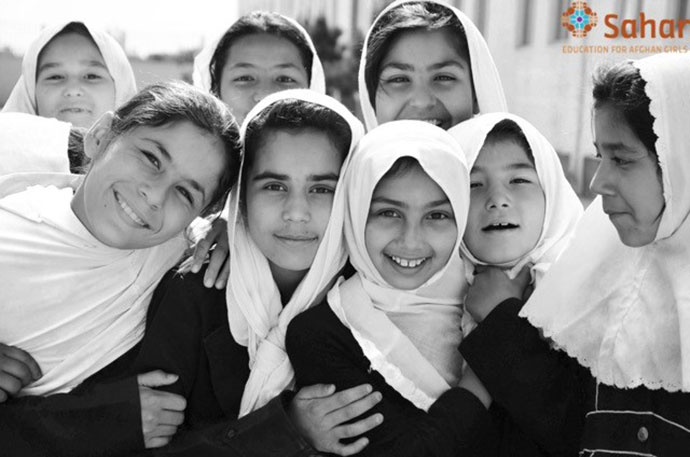 The organization’s mission is to create “quality educational opportunities in Afghanistan that empower and inspire children and their families to build peaceful, just and life-affirming communities.” To date, Sahar has built and equipped 18 new schools in Afghanistan and educated approximately 200,000 students. The organization works in rural areas of the Balkh Province region of Afghanistan, where many students are forced to travel great distances to attend school. The journey is too long for many families to be able to afford daily transportation, but walking to school can also be perilous. “If people are in a warzone, or in a zone that is insecure…it stops the entire process” said executive director Ginna Brelsford. By building new schools in areas that need them, Sahar is bringing thousands of girls an education they would have otherwise been kept away from.
The organization’s mission is to create “quality educational opportunities in Afghanistan that empower and inspire children and their families to build peaceful, just and life-affirming communities.” To date, Sahar has built and equipped 18 new schools in Afghanistan and educated approximately 200,000 students. The organization works in rural areas of the Balkh Province region of Afghanistan, where many students are forced to travel great distances to attend school. The journey is too long for many families to be able to afford daily transportation, but walking to school can also be perilous. “If people are in a warzone, or in a zone that is insecure…it stops the entire process” said executive director Ginna Brelsford. By building new schools in areas that need them, Sahar is bringing thousands of girls an education they would have otherwise been kept away from.
“Every year of education makes such a difference in a girl’s life and in her family’s life,” said Brelsford. “One thing we are working on right now, and that I think is really important, is how to keep kids in school.” Airokhsh Faiz Qaisary, an intern from Afghanistan who formerly helped Sahar in her home country and is now working for the organization in Seattle, added, “Many of our student’s parents have missed going to school because of the war. They’re pushing their children so at least if they couldn’t reach their goals, their children can reach their goals.” Sahar fights to help Afghanis keep their daughters in school by maintaining school buildings and preparing the next generation of female educators in Afghanistan.
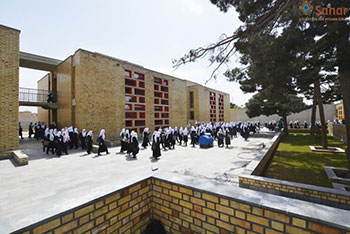 Girls were often prevented from going to school during the Taliban regime once they became teenagers. At a certain age in Afghanistan, girls can only be taught by female instructors. The dearth of female students during the Taliban regime means that there was a time when women weren’t getting teaching certificates. Now, there are not enough female teachers to keep up with the growing number of female students entering Afghanistan’s education system. Of the 412 districts in Afghanistan, 245 currently do not have a single woman qualified to teach. If girls reach a certain age, but there are no women to teach them, then their education is derailed. Sahar funds and manages an Afghan teaching training center that focuses on training female teachers in rural areas where the need for women instructors is greatest. The organization also funds the transportation of women from their villages into urban teacher training centers. This allows women who would have otherwise been deterred by transportation costs to receive the necessary certification to teach in their villages.
Girls were often prevented from going to school during the Taliban regime once they became teenagers. At a certain age in Afghanistan, girls can only be taught by female instructors. The dearth of female students during the Taliban regime means that there was a time when women weren’t getting teaching certificates. Now, there are not enough female teachers to keep up with the growing number of female students entering Afghanistan’s education system. Of the 412 districts in Afghanistan, 245 currently do not have a single woman qualified to teach. If girls reach a certain age, but there are no women to teach them, then their education is derailed. Sahar funds and manages an Afghan teaching training center that focuses on training female teachers in rural areas where the need for women instructors is greatest. The organization also funds the transportation of women from their villages into urban teacher training centers. This allows women who would have otherwise been deterred by transportation costs to receive the necessary certification to teach in their villages.
In addition to building schools and training teachers, Sahar leads a computer literacy program that teaches students skills they may not have otherwise received. “Some of the girls in the computer centers told me if we hadn’t created that specific computer center in their school, they would have probably never been able to use a computer,” said Qaisary. By bringing the computer programs to the students, the students don’t have to worry their families by trekking through insecure territory to the computer center.
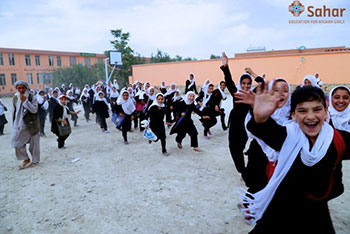 The success of Sahar is, at least in part, the result of the determination and enthusiasm of those whom the organization provides resources for. “If there is anything to emphasize that always strikes me, is the motivation and passion that girls and people who want to be teachers have,” said Brelsford. “They’re continuing to want to be educated over all the barriers.” Qaisary views Sahar’s work as symbolic of a larger shift in Afghanistan concerning education. “I don’t believe that we are going to go back to where we were a few years ago with the war and the Taliban. I do believe that Afghanistan is going to move forward, especially with education,” she said.
The success of Sahar is, at least in part, the result of the determination and enthusiasm of those whom the organization provides resources for. “If there is anything to emphasize that always strikes me, is the motivation and passion that girls and people who want to be teachers have,” said Brelsford. “They’re continuing to want to be educated over all the barriers.” Qaisary views Sahar’s work as symbolic of a larger shift in Afghanistan concerning education. “I don’t believe that we are going to go back to where we were a few years ago with the war and the Taliban. I do believe that Afghanistan is going to move forward, especially with education,” she said.
Sahar aims to continue expanding and bringing more educational opportunities to Afghan girls. The work Sahar does to help girls fulfill their potential has been deeply rewarding for those involved. “I just went and saw the opening of the [latest] school, and there is an extreme sense of reward that comes from three and a half years of managing a construction project,” said Brelsford. “Physically being there and seeing the girls so excited, and talking about their futures, and seeing them empowered, playing soccer…[our work] comes down to the passion that girls themselves have to learn.”
Changemaker
Patrick Awuah, Founder & President, Ashesi University
By Kaitlin Marshall
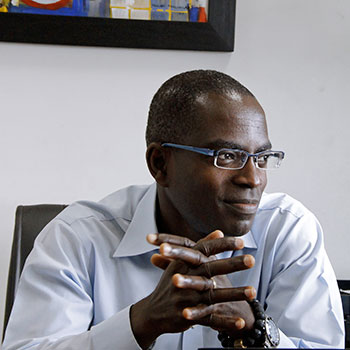 Approximately 10% of college-aged students in Ghana, West Africa are currently enrolled in a post-secondary institution. Patrick Awuah founded Ashesi University in response to the dearth of opportunities in higher education in his home country. The mission of Ashesi, a private liberal arts university in Ghana, is to “educate a new generation of ethical and entrepreneurial leaders in Africa; to cultivate within [its] students the critical thinking skills, the concern for others, and the courage it takes to transform the continent.” Since opening its doors, 100% of graduates have received job offers, started their own business, or gone on to pursue postgraduate degrees around the world.
Approximately 10% of college-aged students in Ghana, West Africa are currently enrolled in a post-secondary institution. Patrick Awuah founded Ashesi University in response to the dearth of opportunities in higher education in his home country. The mission of Ashesi, a private liberal arts university in Ghana, is to “educate a new generation of ethical and entrepreneurial leaders in Africa; to cultivate within [its] students the critical thinking skills, the concern for others, and the courage it takes to transform the continent.” Since opening its doors, 100% of graduates have received job offers, started their own business, or gone on to pursue postgraduate degrees around the world.
The immense success of Ashesi is the result of Awuah’s dedication and visionary thinking. Before founding Ashesi, Awuah spent time in the U.S., receiving bachelor’s degrees in Engineering and Economics from Swarthmore College and working as a program manager for Microsoft where he spearheaded technology for dial-up internet access. After working at Microsoft for some time, Awuah felt compelled to return to Ghana to share the knowledge he gained living and learning in the United States. “When my first child was born, I realized I needed to be paying attention to the world we would be leaving for the next generation,” explained Awuah. “That world, I felt, needed an Africa transformed from the current path it was on at the time.”
When Awuah shared with his wife his vision of opening a liberal arts college in Ghana, she gave him her full support. Despite this, Awuah still waited a year and a half to quit Microsoft. “The biggest challenge initially was just working up the courage to leave Microsoft,” confessed Awuah. “I finally realized that my hesitation was all about a fear of failing. I convinced myself that if I didn’t try, I would fail anyway.” To “minimize the risk of failing,” Awuah didn’t go straight from Microsoft back home. Instead, he enrolled in business school at UC Berkeley to learn and develop strategies for beginning a new enterprise. Equipped with an MBA, Awuah established a foundation in Seattle to support Ashesi, recruited donors, and returned to Ghana to open the University.
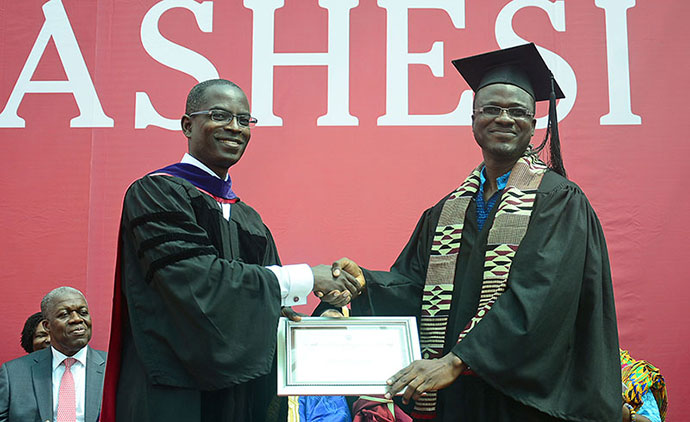 Awuah’s personal experience with higher education molded his vision for Ashesi and the dreams he has for the university’s students. He credits his experience at Swarthmore for showing him what students can accomplish when pushed to think critically about the world. “In Ghana, education tends to be very narrow in terms of the disciplinary focuses students follow. The way to do well in school here is to memorize information and repeat exactly what you’ve memorized,” explained Awuah. “This contrasts sharply with my experience in the United States at Swarthmore.”
Awuah’s personal experience with higher education molded his vision for Ashesi and the dreams he has for the university’s students. He credits his experience at Swarthmore for showing him what students can accomplish when pushed to think critically about the world. “In Ghana, education tends to be very narrow in terms of the disciplinary focuses students follow. The way to do well in school here is to memorize information and repeat exactly what you’ve memorized,” explained Awuah. “This contrasts sharply with my experience in the United States at Swarthmore.”
Awuah’s mission is to take what he has learned and use that knowledge to shape Africa’s next generation of leaders. Ashesi students receive a liberal arts education because of Awuah’s belief that “the world is changing rapidly, and it’s important for people to have flexible minds and to learn to be students for their whole lives.” A liberal arts education, Awuah explained, is an effective way to teach students how to be self-aware, empathetic, and emotionally intelligent leaders. “The best leaders in the world are good citizens who are committed to learning all their lives and sharing their knowledge,” said Awuah. The entire faculty at Ashesi makes sure that students are engaged in an active way and learning how to contribute to the development of an ethical society. By marrying liberal arts with science and business, Ashesi educates future leaders who “can be analytical in a qualitative as well as in a quantitative way.”
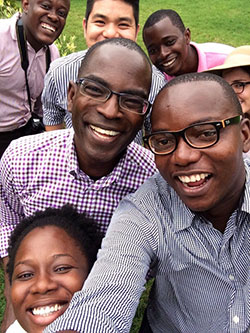 Ashesi began with thirty students squeezed into rented classrooms. Today, it has its own beautiful campus with an enrollment of 600 students. Pending approval, Ashesi will soon offer additional majors in Electrical Engineering, Computer Engineering, and Mechanical Engineering. What Awuah is most proud of, however, is that the students voted to implement and respect a university honor code, the first in an African university. Under the honor code, students take all of their exams without supervision, and take on the responsibility to maintain honesty in their exams. The honor code was a step towards sustaining the high-trust community that Ashesi continues to build. “It’s a very clear indication that our students are taking very seriously this idea of Africa transformed, this idea that Africa will be transformed by enlightened leaders, and that they are committed to being those enlightened leaders for our society,” said Awuah. The honor code is a manifestation of everything Awuah hoped his students would learn when he left Microsoft to open the university.
Ashesi began with thirty students squeezed into rented classrooms. Today, it has its own beautiful campus with an enrollment of 600 students. Pending approval, Ashesi will soon offer additional majors in Electrical Engineering, Computer Engineering, and Mechanical Engineering. What Awuah is most proud of, however, is that the students voted to implement and respect a university honor code, the first in an African university. Under the honor code, students take all of their exams without supervision, and take on the responsibility to maintain honesty in their exams. The honor code was a step towards sustaining the high-trust community that Ashesi continues to build. “It’s a very clear indication that our students are taking very seriously this idea of Africa transformed, this idea that Africa will be transformed by enlightened leaders, and that they are committed to being those enlightened leaders for our society,” said Awuah. The honor code is a manifestation of everything Awuah hoped his students would learn when he left Microsoft to open the university.
Awuah will continue working to expand Ashesi’s impact. He hopes that other schools will adopt a liberal arts model and help educate the next generation of leaders who will graduate ready to contribute to the development of Africa. “What I feel we need to do with education, any society needs to do,” said Awuah, “is be really very intentional about developing citizens who care about the common good. We need to develop citizens who are problem solvers and who can be part of the social capital of society.” With the vast majority of Ashesi’s students staying in Africa after graduation, Awuah’s goal to shape leaders committed to the good of their society is clearly within sight.
Welcome New Members
Please welcome our newest Global Washington members. Take a moment to familiarize yourself with their work and consider opportunities for support and collaboration!
Kobi Academy
Kobi Academy’s mission is to provide exceptional education that empowers children in Ethiopia to be creative, achievement oriented, compassionate citizens committed to life-long learning and community stewardship. kobiacademy.org
Rainmakers TV
A documentary series established to communicate stories of leadership, innovation and social responsibility that inspire global transformation. rainmakers.tv
Member Events
July 29: Pangea Giving // Coffee and Chat
July 31: Mercy Corps // aptART Exhibit
August 5: WCIT // Summer Luncheon
August 6: Mobility Outreach International // Happy Hour for a Great Cause
Career Center
Highlighted Positions
Digital Engagement Specialist – Oxfam America
Deputy Director, Global Marketing – Population Services International (PSI)
REAL Change Election Fellow – RESULTS
For more jobs and resources, visit https://globalwa.org/resources/careers-in-development/
GlobalWA Events
July 23: Charting a Career in International Development
July 30: Networking Happy Hour with Friends of GlobalWA, Humanosphere and World Affairs Council
August 27: Premiere of Around the World in Seattle
September 12: 2015 Member Celebration
September 16: New Member Orientation
December 10: GlobalWA 7th Annual Conference